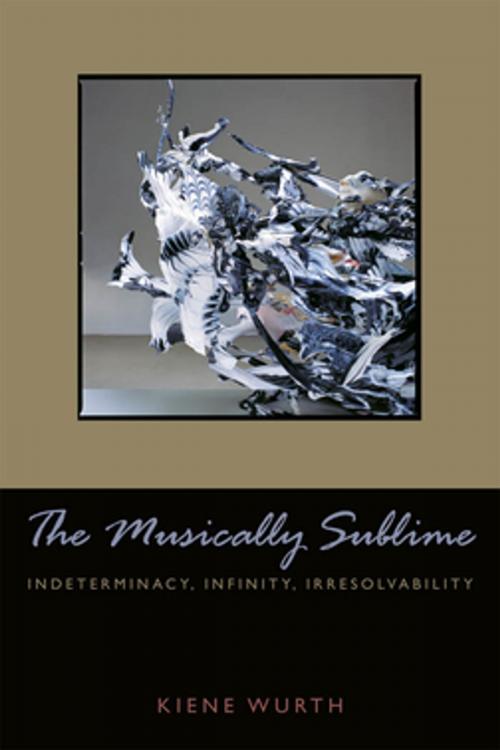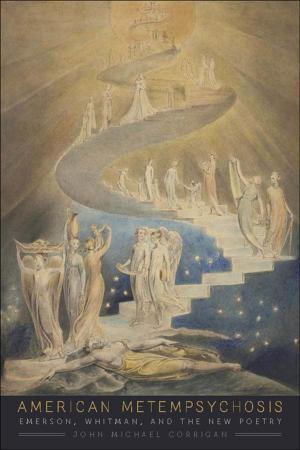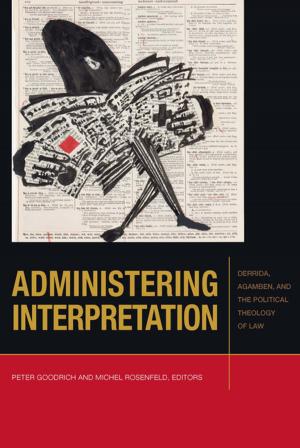Musically Sublime
Indeterminacy, Infinity, Irresolvability
Nonfiction, Religion & Spirituality, Philosophy, Aesthetics, Entertainment, Music, Music Styles, Classical & Opera, Classical| Author: | Kiene Brillenburg Wurth | ISBN: | 9780823230655 |
| Publisher: | Fordham University Press | Publication: | August 25, 2009 |
| Imprint: | Fordham University Press | Language: | English |
| Author: | Kiene Brillenburg Wurth |
| ISBN: | 9780823230655 |
| Publisher: | Fordham University Press |
| Publication: | August 25, 2009 |
| Imprint: | Fordham University Press |
| Language: | English |
Musically Sublime rewrites musically the history and philosophy of the sublime. Music enables us to reconsider the traditional course of sublime feeling on a track from pain to pleasure. Resisting the notion that there is a single format for sublime feeling, Wurth shows how, from the mid eighteenth century onward, sublime feeling is, instead, constantly rearticulated in a complex interaction with musicality.
Wurth takes as her point of departure Immanuel Kant's Critique of Judgment and Jean-François Lyotard's aesthetic writings of the 1980s and 1990s. Kant framed the sublime narratively as an epic of self-transcendence. By contrast, Lyotard sought to substitute open immanence for Kantian transcendence, yet he failed to deconstruct the Kantian epic. The book performs this deconstruction by juxtaposing eighteenth- and nineteenth-century conceptions of the infinite, Sehnsucht, the divided self, and unconscious drives with contemporary readings of instrumental music.
Critically assessing Edmund Burke, James Usher, E.T.A. Hoffmann, Novalis, Friedrich Hölderlin, Arthur Schopenhauer, Richard Wagner, and Friedrich Nietzsche, this book re-presents the sublime as a feeling that defers resolution and hangs suspended between pain and pleasure. Musically Sublime rewrites the mathematical sublime as différance, while it redresses the dynamical sublime as trauma: unending, undetermined, unresolved.
Whereas most musicological studies in this area have focused on traces of the Kantian sublime in Handel, Haydn, and Beethoven, this book calls on the nineteenth-century theorist Arthur Seidl to analyze the sublime of, rather than in, music. It does so by invoking Seidl's concept of formwidrigkeit ("form-contrariness") in juxtaposition with Romantic piano music, (post)modernist musical minimalisms, and Lyotard's postmodern sublime. It presents a sublime of matter, rather than form-performative rather than representational. In doing so, Musically Sublime shows that the binary distinction Lyotard posits between the postmodern and romantic sublime is finally untenable.
Musically Sublime rewrites musically the history and philosophy of the sublime. Music enables us to reconsider the traditional course of sublime feeling on a track from pain to pleasure. Resisting the notion that there is a single format for sublime feeling, Wurth shows how, from the mid eighteenth century onward, sublime feeling is, instead, constantly rearticulated in a complex interaction with musicality.
Wurth takes as her point of departure Immanuel Kant's Critique of Judgment and Jean-François Lyotard's aesthetic writings of the 1980s and 1990s. Kant framed the sublime narratively as an epic of self-transcendence. By contrast, Lyotard sought to substitute open immanence for Kantian transcendence, yet he failed to deconstruct the Kantian epic. The book performs this deconstruction by juxtaposing eighteenth- and nineteenth-century conceptions of the infinite, Sehnsucht, the divided self, and unconscious drives with contemporary readings of instrumental music.
Critically assessing Edmund Burke, James Usher, E.T.A. Hoffmann, Novalis, Friedrich Hölderlin, Arthur Schopenhauer, Richard Wagner, and Friedrich Nietzsche, this book re-presents the sublime as a feeling that defers resolution and hangs suspended between pain and pleasure. Musically Sublime rewrites the mathematical sublime as différance, while it redresses the dynamical sublime as trauma: unending, undetermined, unresolved.
Whereas most musicological studies in this area have focused on traces of the Kantian sublime in Handel, Haydn, and Beethoven, this book calls on the nineteenth-century theorist Arthur Seidl to analyze the sublime of, rather than in, music. It does so by invoking Seidl's concept of formwidrigkeit ("form-contrariness") in juxtaposition with Romantic piano music, (post)modernist musical minimalisms, and Lyotard's postmodern sublime. It presents a sublime of matter, rather than form-performative rather than representational. In doing so, Musically Sublime shows that the binary distinction Lyotard posits between the postmodern and romantic sublime is finally untenable.















